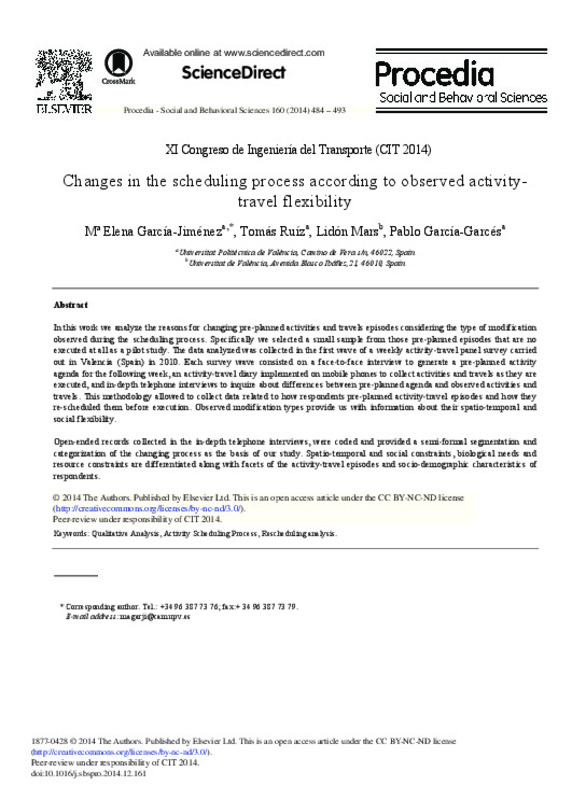JavaScript is disabled for your browser. Some features of this site may not work without it.
Buscar en RiuNet
Listar
Mi cuenta
Estadísticas
Ayuda RiuNet
Admin. UPV
Changes in the scheduling process according to observed activity- travel flexibility
Mostrar el registro sencillo del ítem
Ficheros en el ítem
| dc.contributor.author | Garcia-Jiménez, María Elena
|
es_ES |
| dc.contributor.author | Ruiz Sánchez, Tomás
|
es_ES |
| dc.contributor.author | Mars, Lidón
|
es_ES |
| dc.contributor.author | García Garcés, Pablo
|
es_ES |
| dc.date.accessioned | 2015-09-25T11:18:37Z | |
| dc.date.available | 2015-09-25T11:18:37Z | |
| dc.date.issued | 2014 | |
| dc.identifier.issn | 1877-0428 | |
| dc.identifier.uri | http://hdl.handle.net/10251/55112 | |
| dc.description.abstract | In this work we analyze the reasons for changing pre-planned activities and travels episodes considering the type of modification observed during the scheduling process. Specifically we selected a small sample from those pre-planned episodes that are no executed at all as a pilot study. The data analyzed was collected in the first wave of a weekly activity-travel panel survey carried out in Valencia (Spain) in 2010. Each survey wave consisted on a face-to-face interview to generate a pre-planned activity agenda for the following week, an activity-travel diary implemented on mobile phones to collect activities and travels as they are executed, and in-depth telephone interviews to inquire about differences between pre-planned agenda and observed activities and travels. This methodology allowed to collect data related to how respondents pre-planned activity-travel episodes and how they re-scheduled them before execution. Observed modification types provide us with information about their spatio-temporal and social flexibility. Open-ended records collected in the in-depth telephone interviews, were coded and provided a semi-formal segmentation and categorization of the changing process as the basis of our study. Spatio-temporal and social constraints, biological needs and resource constraints are differentiated along with facets of the activity-travel episodes and socio-demographic characteristics of respondents. | es_ES |
| dc.language | Inglés | es_ES |
| dc.publisher | Elsevier | es_ES |
| dc.relation.ispartof | Procedia Social and Behavioral Sciences | es_ES |
| dc.rights | Reconocimiento - No comercial - Sin obra derivada (by-nc-nd) | es_ES |
| dc.subject | Activity Scheduling Process | es_ES |
| dc.subject | Qualitative Analysis | es_ES |
| dc.subject | Rescheduling analysis | es_ES |
| dc.subject.classification | INGENIERIA E INFRAESTRUCTURA DE LOS TRANSPORTES | es_ES |
| dc.title | Changes in the scheduling process according to observed activity- travel flexibility | es_ES |
| dc.type | Artículo | es_ES |
| dc.identifier.doi | 10.1016/j.sbspro.2014.12.161 | |
| dc.rights.accessRights | Abierto | es_ES |
| dc.contributor.affiliation | Universitat Politècnica de València. Departamento de Ingeniería e Infraestructura de los Transportes - Departament d'Enginyeria i Infraestructura dels Transports | es_ES |
| dc.description.bibliographicCitation | Garcia-Jiménez, ME.; Ruiz Sánchez, T.; Mars, L.; García Garcés, P. (2014). Changes in the scheduling process according to observed activity- travel flexibility. Procedia Social and Behavioral Sciences. 160:484-493. doi:10.1016/j.sbspro.2014.12.161 | es_ES |
| dc.description.accrualMethod | S | es_ES |
| dc.relation.publisherversion | http://dx.doi.org/10.1016/j.sbspro.2014.12.161 | es_ES |
| dc.description.upvformatpinicio | 484 | es_ES |
| dc.description.upvformatpfin | 493 | es_ES |
| dc.type.version | info:eu-repo/semantics/publishedVersion | es_ES |
| dc.description.volume | 160 | es_ES |
| dc.relation.senia | 290022 | es_ES |








